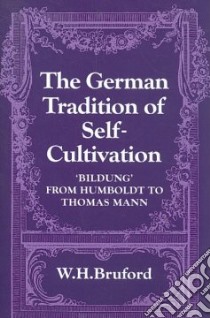- Libreria
- >
- Libri in lingua
- >
The German Tradition of Self-cultivation - 9780521129008
Un libro in lingua di Bruford w. H. edito da Cambridge Univ Pr, 2010
- € 35.80
- Il prezzo è variabile in funzione del cambio della valuta d’origine
In a lecture in 1923, Thomas Mann said that the ordinary middle-class German had never considered culture to include an interest in politics, and still not do so. `To ask him to transfer his allegiance frominwardness to the objective, to politics, to what the peoples of Europe call freedom, would seem to him to amount to a demand that he should do violence to his own nature and abandon his sense of national identity.'
The idea of the true freedom which comes to the man who lives as much as possible in the invisible world of culture and accepts as a kind of fate his social, political and material circumstances, was indeed at the heart of the German idealism of Goethe's day, and unworldliness went along with very great achievements in literature, scholarship and philosophy. Bildung, self-cultivation, came to be as natural a requirement of educated middle-class life as sport was in England. Hence the cliche in 1914 of the `good' Germany, so unaccountably displaced, as it seemed, by a country bent, like its neighbours, on national power and material progress.
In this book, originally published in 1975, Professor Bruford provides a sequel to Culture and Society in Classical Weimar 1775-1806, and shows how the ideal of self-cultivation has entered into the thought of a number of highly individual German philosopehers, theologians, poets and novelists, each in his own corner of the rapidly changing world of the nineteenth century.
Informazioni bibliografiche
- Titolo del Libro in lingua: The German Tradition of Self-cultivation
- Sottotitolo: Bildung from Humboldt to Thomas Mann
- Lingua: English
- Autore: Bruford w. H.
- Editore: Cambridge Univ Pr
- Collana: Cambridge Univ Pr (Paperback)
- Data di Pubblicazione: 04 Febbraio '10
- Genere: LITERARY CRITICISM
- Argomenti : German fiction History and criticism Psychological fiction, German History and criticism Maturation (Psychology) in literature
- Pagine: 290
- Dimensioni mm: 215 x 139 x 19
- ISBN-10: 0521129001
- EAN-13: 9780521129008


